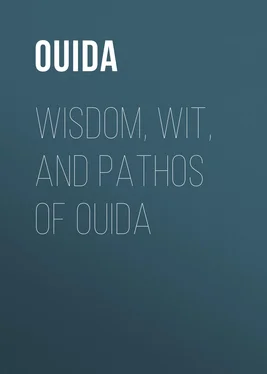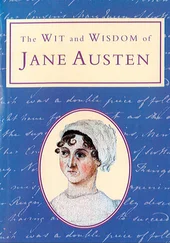Ouida - Wisdom, Wit, and Pathos of Ouida
Здесь есть возможность читать онлайн «Ouida - Wisdom, Wit, and Pathos of Ouida» — ознакомительный отрывок электронной книги совершенно бесплатно, а после прочтения отрывка купить полную версию. В некоторых случаях можно слушать аудио, скачать через торрент в формате fb2 и присутствует краткое содержание. Жанр: foreign_prose, literature_19, foreign_antique, на английском языке. Описание произведения, (предисловие) а так же отзывы посетителей доступны на портале библиотеки ЛибКат.
- Название:Wisdom, Wit, and Pathos of Ouida
- Автор:
- Жанр:
- Год:неизвестен
- ISBN:нет данных
- Рейтинг книги:4 / 5. Голосов: 1
-
Избранное:Добавить в избранное
- Отзывы:
-
Ваша оценка:
- 80
- 1
- 2
- 3
- 4
- 5
Wisdom, Wit, and Pathos of Ouida: краткое содержание, описание и аннотация
Предлагаем к чтению аннотацию, описание, краткое содержание или предисловие (зависит от того, что написал сам автор книги «Wisdom, Wit, and Pathos of Ouida»). Если вы не нашли необходимую информацию о книге — напишите в комментариях, мы постараемся отыскать её.
Wisdom, Wit, and Pathos of Ouida — читать онлайн ознакомительный отрывок
Ниже представлен текст книги, разбитый по страницам. Система сохранения места последней прочитанной страницы, позволяет с удобством читать онлайн бесплатно книгу «Wisdom, Wit, and Pathos of Ouida», без необходимости каждый раз заново искать на чём Вы остановились. Поставьте закладку, и сможете в любой момент перейти на страницу, на которой закончили чтение.
Интервал:
Закладка:
She rose and looked; a line of twine was trembling against the foliage; in its noosed end the throat of the mavis had been caught; it hung trembling and clutching at the air convulsively with its little drawn-up feet. It had flown into the trap as it had ended its joyous song and soared up to join its brethren.
There were a score of such traps set in the miller's garden.
She unloosed the cord from about its tiny neck, set it free, and laid it down upon the ivy. The succour came too late; the little gentle body was already without breath; the feet had ceased to beat the air; the small soft head had drooped feebly on one side; the lifeless eyes had started from their sockets; the throat was without song for evermore.
"The earth would be good but for men," she thought, as she stood with the little dead bird in her hand.
Its mate, which was poised on a rose bough, flew straight to it, and curled round and round about the small slain body, and piteously bewailed its fate, and mourned, refusing to be comforted, agitating the air with trembling wings, and giving out vain cries of grief.
Vain; for the little joyous life was gone; the life that asked only of God and Man a home in the green leaves; a drop of dew from the cup of a rose; a bough to swing on in the sunlight; a summer day to celebrate in song.
All the winter through, it had borne cold and hunger and pain without lament; it had saved the soil from destroying larvæ, and purified the trees from all foul germs; it had built its little home unaided, and had fed its nestlings without alms; it had given its sweet song lavishly to the winds, to the blossoms, to the empty air, to the deaf ears of men; and now it lay dead in its innocence; trapped and slain because a human greed begrudged it a berry worth the thousandth part of a copper coin.
Out from the porch of the mill-house Claudis Flamma came, with a knife in his hand and a basket, to cut lilies for one of the choristers of the cathedral, since the morrow would be the religious feast of the Visitation of Mary.
He saw the dead thrush in her hand, and chuckled to himself as he went by.
"The tenth bird trapped since sunrise," he said, thinking how shrewd and how sure in their make were these traps of twine that he set in the grass and the leaves.
She said nothing; but the darkness of disgust swept over her face, as he came in sight in the distance.
She knelt down and scraped a hole in the earth; and laid moss in it, and put the mavis softly on its green and fragrant bier, and covered it with handfuls of fallen rose leaves, and with a sprig or two of thyme.
Around her head the widowed thrush flew ceaselessly, uttering sad cries;—who now should wander with him through the sunlight?—who now should rove with him above the blossoming fields?—who now should sit with him beneath the boughs hearing the sweet rain fall between the leaves?—who now should wake with him whilst yet the world was dark, to feel the dawn break ere the east were red, and sing a welcome to the unborn day?
And, indeed, to those who are alive to the nameless, universal, eternal soul which breathes in all the grasses of the fields, and beams in the eyes of all creatures of earth and air, and throbs in the living light of palpitating stars, and thrills through the young sap of forest trees, and stirs in the strange loves of wind-borne plants, and hums in every song of the bee, and burns in every quiver of the flame, and peoples with sentient myriads every drop of dew that gathers on a harebell, every bead of water that ripples in a brook—to these the mortal life of man can seem but little, save at once the fiercest and the feeblest thing that does exist; at once the most cruel and the most impotent; tyrant of direst destruction and bondsman of lowest captivity.
Hence, pity entered very little into his thoughts at any time; the perpetual torture of life did indeed perplex him, as it perplexes every thinking creature, with wonder at the universal bitterness that taints all creation, at the universal death whereby all forms of life are nurtured, at the universal anguish of all existence which daily and nightly assails the unknown God in piteous protest at the inexorable laws of inexplicable miseries and mysteries. But because such suffering was thus universal, therefore he almost ceased to feel pity for it; of the two he pitied the beasts far more than the human kind:—the horse staggering beneath the lash in all the feebleness of hunger, lameness, and old age; the ox bleeding from the goad on the hard furrows, or stumbling through the hooting crowd, blind, footsore, and shivering, to its last home in the slaughter-house; the dog, yielding up its noble life inch by inch under the tortures of the knife, loyally licking the hand of the vivisector while he drove his probe through its quivering nerves; the unutterable hell in which all these gentle, kindly, and long-suffering creatures dwelt for the pleasure or the vanity, the avarice or the brutality of men,—these he pitied perpetually, with a tenderness for them that was the softest thing in all his nature.
"There lived once in the East, a great king; he dwelt far away, amongst the fragrant fields of roses, and in the light of suns that never set.
"He was young, he was beloved, he was fair of face and form; and the people, as they hewed stone, or brought water, said amongst themselves, 'Verily, this man is as a god; he goes where he lists, and he lies still or rises up as he pleases; and all fruits of all lands are culled for him; and his nights are nights of gladness, and his days, when they dawn, are all his to sleep through or spend as he wills.' But the people were wrong. For this king was weary of his life.
"His buckler was sown with gems, but his heart beneath it was sore. For he had been long bitterly harassed by foes who descended on him as wolves from the hills in their hunger, and he had been long plagued with heavy wars and with bad rice harvests, and with many troubles to his nation that kept it very poor, and forbade him to finish the building of new marble palaces, and the making of fresh gardens of delight, on which his heart was set. So he, being weary of a barren land and of an empty treasury, with all his might prayed to the gods that all he touched might turn to gold, even as he had heard had happened to some magician long before in other ages. And the gods gave him the thing he craved; and his treasury overflowed. No king had ever been so rich, as this king now became in the short space of a single summer-day.
"But it was bought with a price.
"When he stretched out his hand to gather the rose that blossomed in his path, a golden flower scentless and stiff was all he grasped. When he called to him the carrier-dove that sped with a scroll of love words across the mountains, the bird sank on his breast a carven piece of metal. When he was athirst and shouted to his cupbearer for drink, the red wine ran a stream of molten gold. When he would fain have eaten, the pulse and the pomegranate grew alike to gold between his teeth. And lo! at eventide, when he sought the silent chambers of his harem, saying, 'Here at least shall I find rest,' and bent his steps to the couch whereon his best-beloved slave was sleeping, a statue of gold was all he drew into his eager arms, and cold shut lips of sculptured gold were all that met his own.
"That night the great king slew himself, unable any more to bear this agony; since all around him was desolation, even though all around him was wealth.
"Now the world is too like that king, and in its greed of gold it will barter its life away.
"Look you,—this thing is certain—I say that the world will perish, even as that king perished, slain as he was slain, by the curse of its own fulfilled desire.
"The future of the world is written. For God has granted their prayer to men. He has made them rich, and their riches shall kill them.
Читать дальшеИнтервал:
Закладка:
Похожие книги на «Wisdom, Wit, and Pathos of Ouida»
Представляем Вашему вниманию похожие книги на «Wisdom, Wit, and Pathos of Ouida» списком для выбора. Мы отобрали схожую по названию и смыслу литературу в надежде предоставить читателям больше вариантов отыскать новые, интересные, ещё непрочитанные произведения.
Обсуждение, отзывы о книге «Wisdom, Wit, and Pathos of Ouida» и просто собственные мнения читателей. Оставьте ваши комментарии, напишите, что Вы думаете о произведении, его смысле или главных героях. Укажите что конкретно понравилось, а что нет, и почему Вы так считаете.












